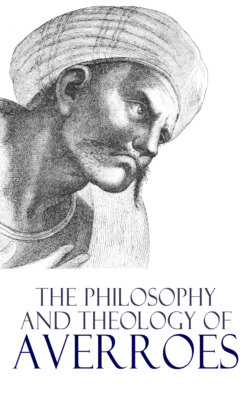The Philosophy and Theology of Averroes

Реклама. ООО «ЛитРес», ИНН: 7719571260.
Оглавление
Averroës. The Philosophy and Theology of Averroes
The Philosophy and Theology of Averroes
Table of Contents
PREFACE
I. A DECISIVE DISCOURSE ON THE DELINEATION OF THE RELATION BETWEEN RELIGION AND PHILOSOPHY
FOOTNOTES
Ia. APPENDIX. ON THE PROBLEM OF ETERNAL KNOWLEDGE, WHICH AVERROES HAS MENTIONED IN HIS DECISIVE DISCOURSE
FOOTNOTES
II. AN EXPOSITION OF THE METHODS OF ARGUMENTS CONCERNING THE BELIEFS OF THE FAITH, AND A DETERMINATION OF UNCERTAIN DOUBTS AND MISLEADING INNOVATIONS IN INTERPRETATIONS
OF THE UNITY OF GOD
ON DIVINE ATTRIBUTES
OF DIVINE PERFECTION
OF DIRECTION
OF THE ACTIONS OF GOD
FOOTNOTES
Отрывок из книги
Averroes
A Middle Ages Arabic Tractate
.....
You ought to be aware that the real purpose of the Law is to impart the knowledge of truth and of right action. The knowledge of truth consists in the cognisance of God and the whole universe with its inner significance, especially that of religion, and the knowledge of happiness or misery of the next world. Right action consists in following those actions which are useful for happiness and avoiding those which lead to misery. The knowledge of these actions has been called practical knowledge. This is divided into two kinds: external actions, the knowledge of which is called Fiqh, that is, Theology; and actions pertaining to feelings, such as gratitude, patience, and other points of character to which the Law has urged us or from which it has prohibited us. This is called the knowledge of continence and of the next world. Abu Hamid in his book The Revivification of the Sciences of Religion seems to be inclined to this kind, and as the people have always turned away from the former kind of knowledge and have turned themselves to the second which leads them easily to piety, the book attained its name. But we have wandered from our own purpose and will now return to it.
If the purpose of the Law is to impart the knowledge of truth and of right action, this cannot be attained except by one of the two methods: viz, by conception or verification such as Mutakallimun have maintained in their books. There are three methods of verification open to people: philosophy, dogmatics and exhortation. There are two methods of conception: either by the thing itself, or by its like. As all people cannot by their nature understand and accept philosophical and dogmatic arguments, together with the difficulty of learning the use of inferences and the long time it takes to learn them, and the purpose of the Law being to be quite common among men, it is necessary that it should contain all kinds of verifications and conceptions. Among the methods of verification there are some which are meant for the common people: that is, exhortative and dogmatic, the exhortative being more common than the other. There is one method which is meant solely for the learned, and that is the method of rational inference. Now, it is the primary aim of the Law to improve the condition of the many without neglecting the few, and hence the method of conception and verification adopted are common to the majority.
.....